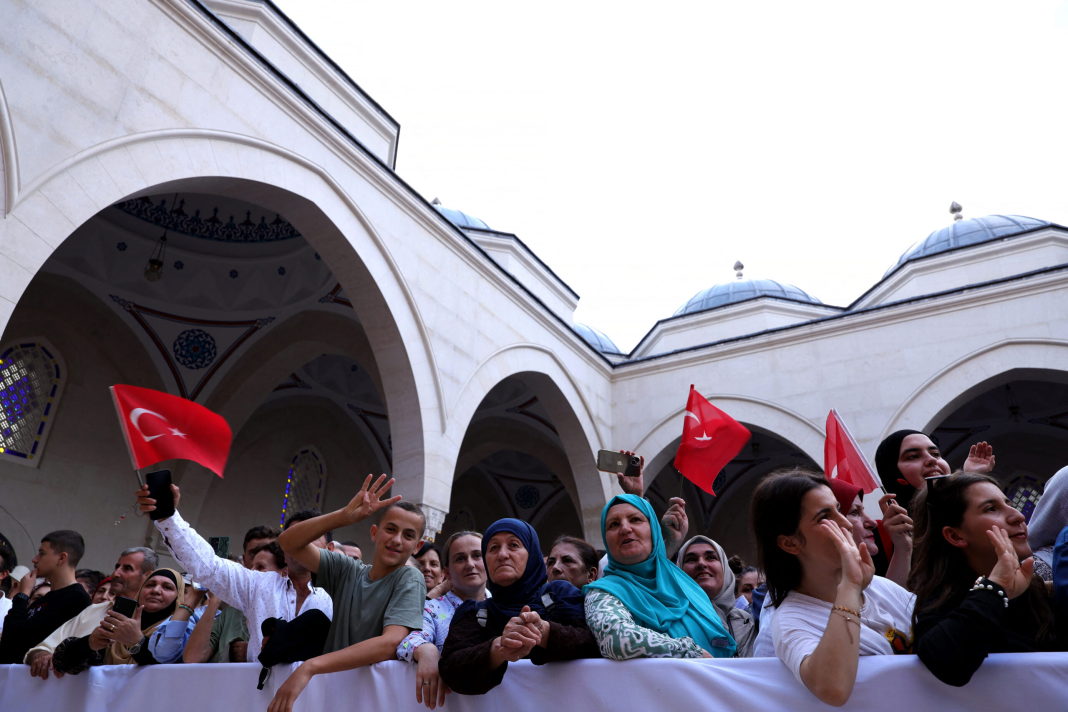Nevila Gjata
On Thursday, October 10th, Turkish President Recep Tayyip Erdoğan made an unexpected official visit to Tirana.
During his one-day visit, Erdoğan and his delegation met with President Bajram Begaj at the Presidential Office, followed by a private meeting with Prime Minister Edi Rama. This was followed by the signing of several bilateral agreements and a joint press conference. Later that afternoon, President Erdoğan and the Albanian Prime Minister inaugurated the Namazgja mosque together.
Everything was carefully planned and followed protocol with a packed agenda focused on the opening of the Namazgja mosque.
The unexpected inauguration, which had been anticipated for years, was preceded by discussions in the Albanian media regarding Turkish President Erdoğan’s influence in Albania and his potential impact on Prime Minister Edi Rama and the Muslim community in Albania.
There has been an ongoing debate for years about the growing influence of Turkey in former Ottoman territories, particularly in the Balkans and the Near East.
This discussion reignited a few days before the inauguration of the Namazgja mosque after a Facebook post by Turkish imam Enes Bastur, who announced that the Turkish Directorate of Religious Affairs had appointed him to lead the mosque in question.
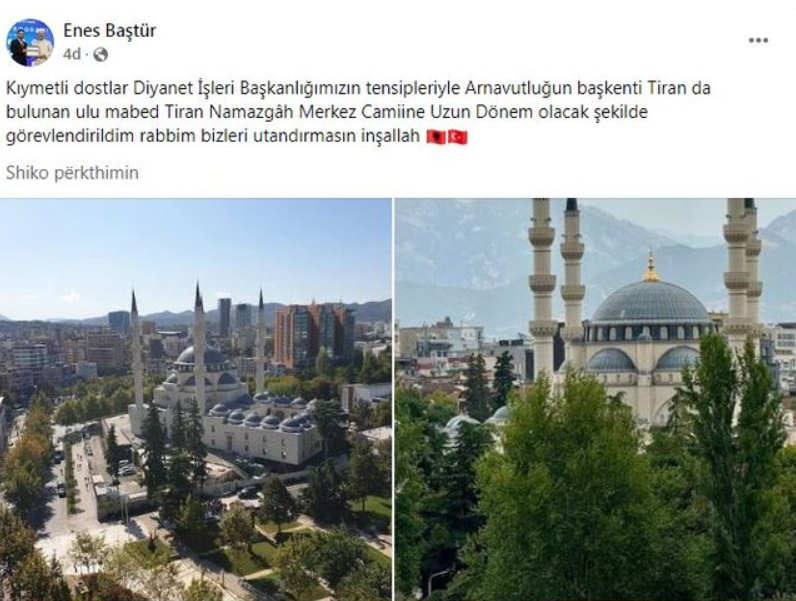
In the picture: The post by Turkish imam Enes Bastur
CNN Turk also reported on the appointment of the Turkish imam
Up until that day, the Albanian Muslim Community had not released an official statement. The Turkish imam’s post was widely circulated in the Albanian media, accompanied by the narrative that the over 30 million euro investment from Turkey would be controlled by a foreign imam
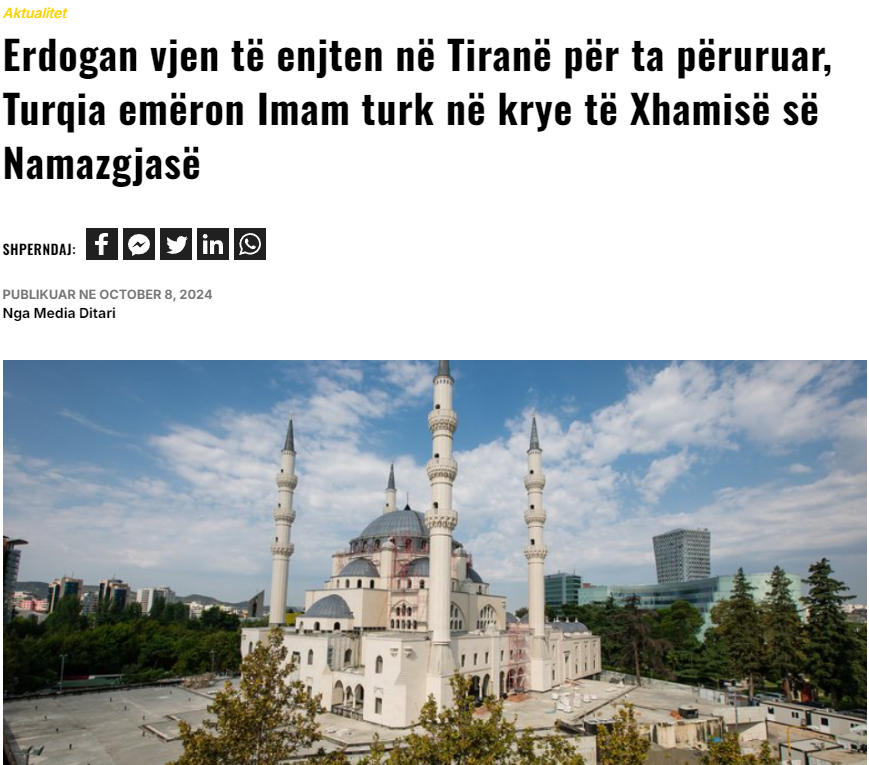
Screenshot of the article following the Turkish imam’s announcement about leading the Namazgja mosque
The Albanian Muslim Community issued an official response only one day later, after the Turkish imam’s post was removed. The statement made no reference to Imam Bastur’s post, thereby sidestepping a direct confrontation with Ankara

Screenshot of the official statement from the Muslim Community of Albania (KMSH)
The Muslim Community announced that the inauguration ceremony of the Namazgja mosque would be officially represented only by the Mufti of Tirana, Mr. Gazment Teqja, who was also designated as the head of the joint foundation board between KMSH and the other party that would manage the Namazgja mosque in the future.
In a subsequent announcement from the Muslim leadership, it was indicated that the Mufti of Tirana (instead of KMSH) reported that Mr. Gazment Teqja would serve as the official imam of the Great Mosque of the capital.
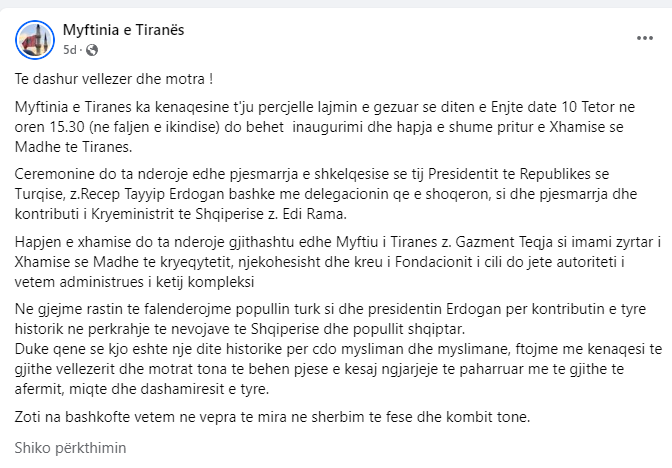
Screenshot of the post from the Mufti of Tirana
The Muslim Community’s reaction did not resolve the debate. Media sources subsequently referred to a statement from former Prime Minister and Democratic Party Leader Sali Berisha, who considered the absence of the head of the Albanian Muslim Community at the inauguration ‘an offense to all Muslim believers.’ He further argued that these developments represented ‘forms of unconstitutional and unacceptable political interference, whether from within or outside, in matters of religious beliefs.’
The opening of the Namazgja mosque was further complicated by the Turkish authorities’ opposition to certain leaders within the Albanian Muslim Community, whom they view as affiliated with the ‘FETO’ rganization led by cleric Fetullah Gülen, which Ankara has classified as a terrorist organization following the failed coup attempt in 2016.
Former head of the Muslim Community, Skënder Bruçaj, stated in an interview with ‘Voice of America‘ that there had been significant political interference from external actors concerning the Namazgja mosque, highlighting the absence of the head of the Albanian Muslim Community at the inauguration as a key issue.
On the other hand, Taulant Bica, the Deputy Chairman of the Muslim Community of Albania (KMSH), told ‘Voice of America’ that the inauguration of the mosque was more important than the presence of officials, regardless of their rank. He further clarified that any appointments related to the mosque would be decided by the foundation’s board.
Meanwhile, the media focused on secondary details, such as the increased presence of Turkish security forces during the inauguration
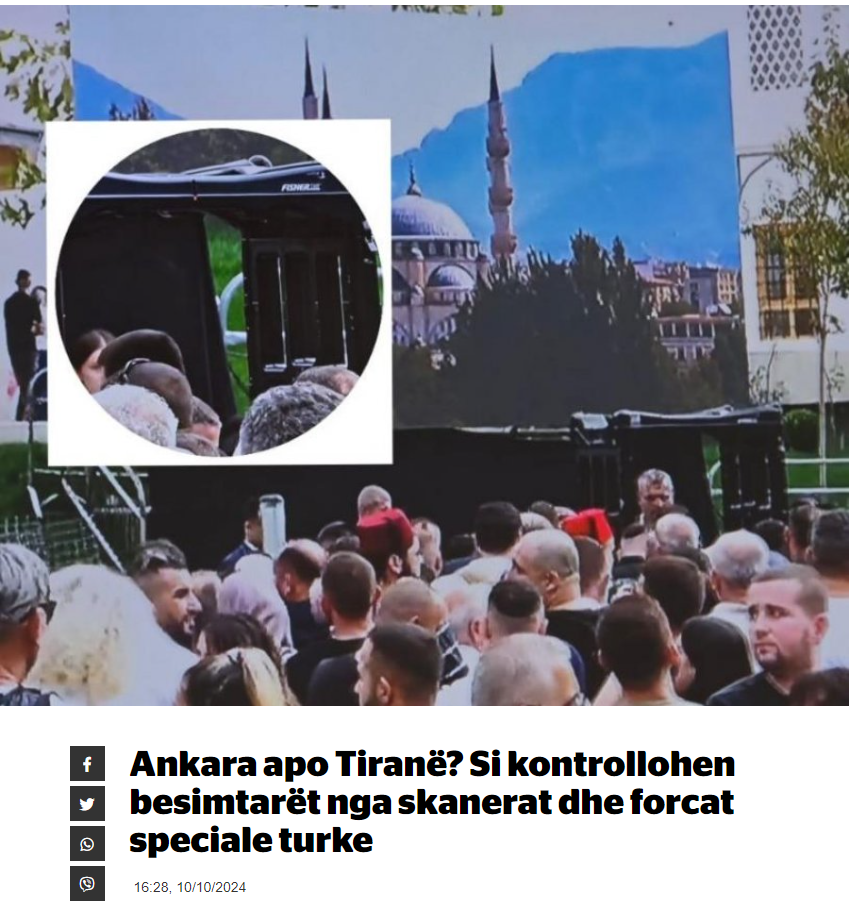
screenshot of the news published on the inauguration day
They also reminded Prime Minister Rama of a promise he made several years ago that he would no longer cut ribbons at events, which was contrary to what was seen alongside Turkish President Erdogan during the ceremony
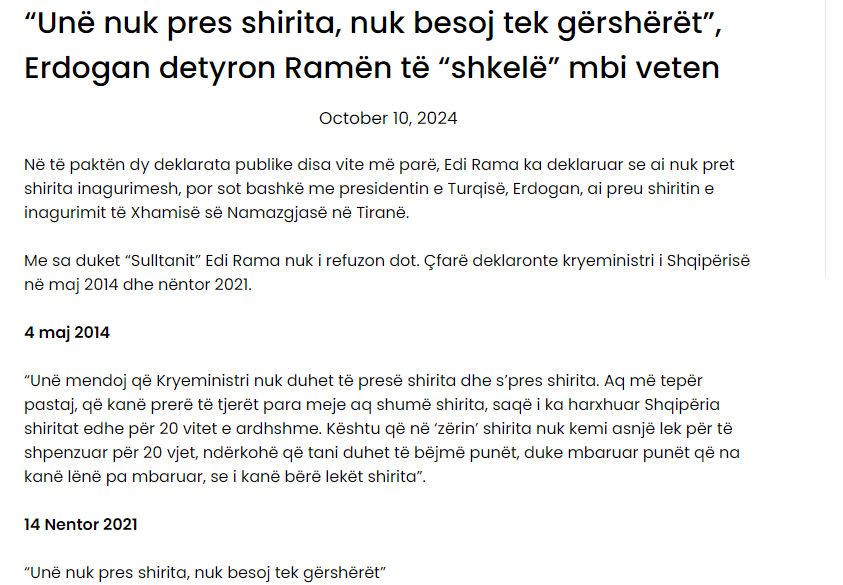
screenshot of the published news
A promise that, in fact, Rama has broken for many years at other events unrelated to Turkey.
Prime Minister Edi Rama attempted to downplay the heated media discourse during his speech at the inauguration, claiming that the large mosque was a reflection of ‘a genuinely Albanian brotherhood. For him, the event illustrated numerous aspects related to faith, also recalling the “ayat from the first six surahs of the Quran in the Albanian language, presented by one of the artisans of independence, Haxhi Hafiz Ibrahim Dalliu.’
His distant stance continued until the end of his statement, when he declared that Albania’s path was irreversible, regardless of religion, region, or ideology. Notably, Rama linked the protection of freedom and identity to the legacy of the ancestors, dating back to Skanderbeg and later Ismail Qemali.
Turkish President Recep Tayyip Erdoğan also reflected on the past, but from a different perspective. He referred to the Namazgja mosque as ‘the largest in the Balkans’ and emphasized its significance in the shared history between the two nations, claiming their roots go ‘very deep, spanning over six centuries.‘
Speaking in the first person plural, Erdoğan remarked that the Namazgja mosque was designed as a structure that beautifully showcases ‘the classic Ottoman architecture that predominates in the Balkans.’
Erdoğan stated that the mosque covers over 10,000 square meters and is designed to serve the same number (10,000) of Muslim worshippers. He described the Namazgja mosque as not only a place for worship, admiration and devotion but also as a multifunctional facility that will include conference halls, a library, and study rooms.
‘Our goal is to reflect the rich cultural heritage of Albania under the theme of the museum of coexistence of Balkan cultures, which is part of the Namazgja mosque complex,’ Erdoğan remarked, underscoring that the mosque has already transformed into an unprecedented achievement.

Photo: Adnan Beci / AFP
‘There are two nations, two populations who have continually stood by each other in every circumstance and adversity with all their capabilities,’ stated the Turkish president. On the same day, the Turkish government also donated several kamikaze drones to Albania, further emphasizing this partnership.
This detail did not escape the scrutiny of the Greek media, (briefly covered in Albanian media), portraying the one-day visit to Tirana as an inseparable connection between Turkish military strength and the proliferation of mosques.
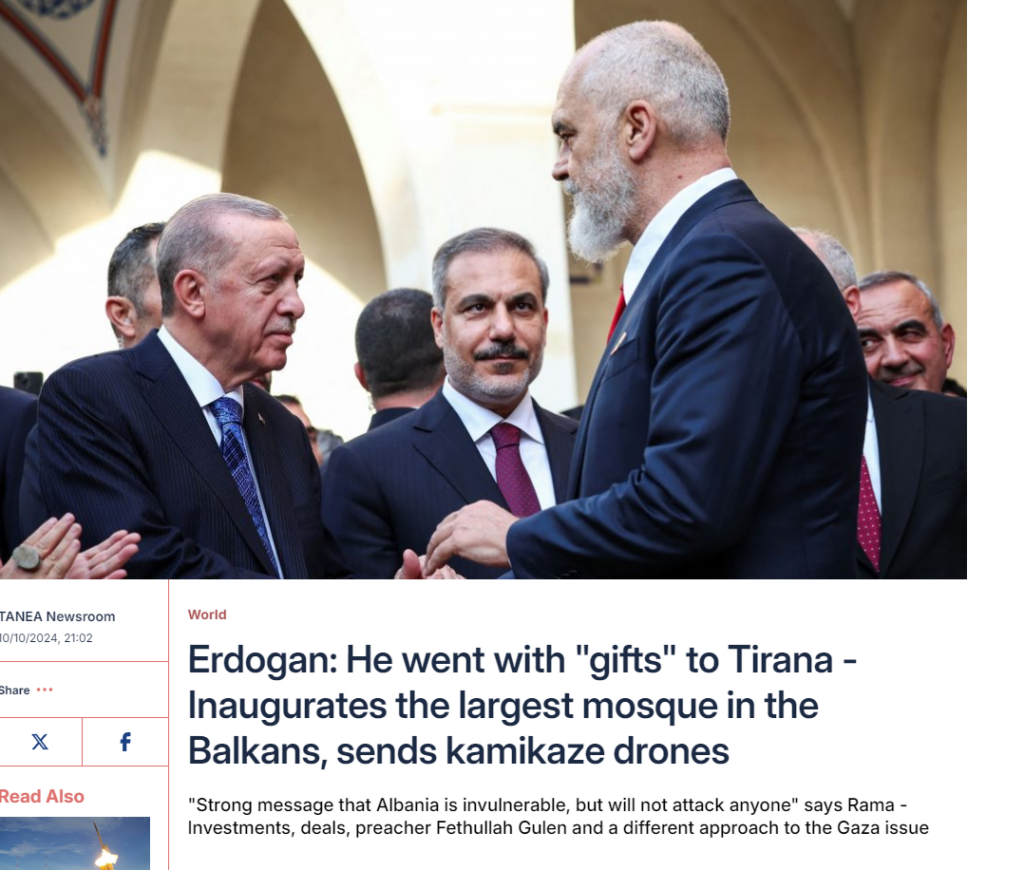
In the meantime, the Albanian Muslim Community resumed its activities without any disturbances, at least in public. Both the Albanian Muslim Community and the Tirana Mufti’s Office shared on their respective Facebook pages that Mufti Gazment Beqja-Bilal had delivered the messages from the first Friday prayer at the Namazgjasë mosque.
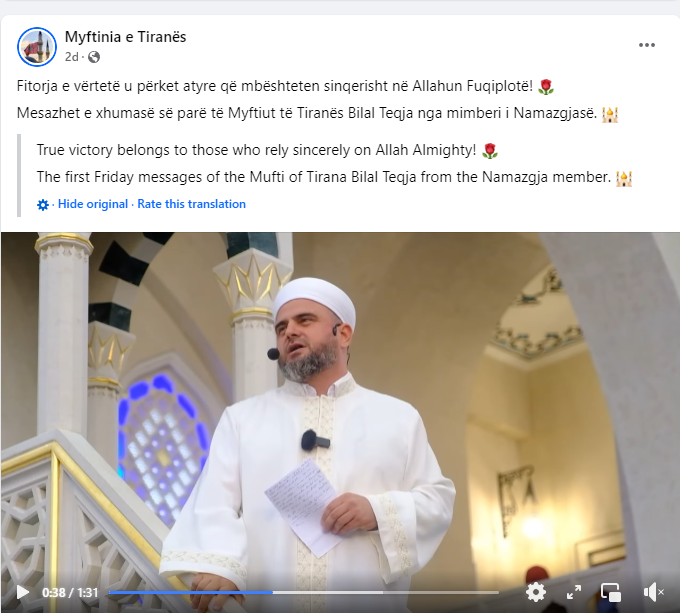
Screenshot of the Facebook post by Tirana’s Mufti
On the day of the inauguration, Prof. Dr. Ali Erbaş, the Chairman of the Directorate of Religious Affairs (Diyanet), prayed for the mosque’s opening after the welcoming speeches from Prime Minister Edi Rama and Turkish President Recep Tayyip Erdoğan.

